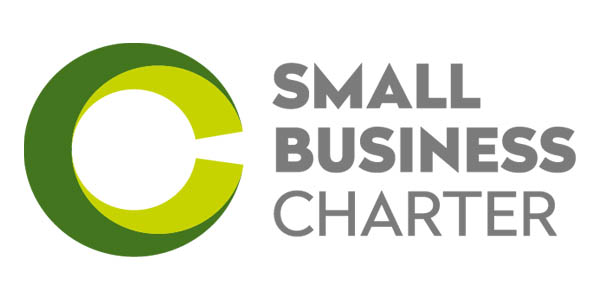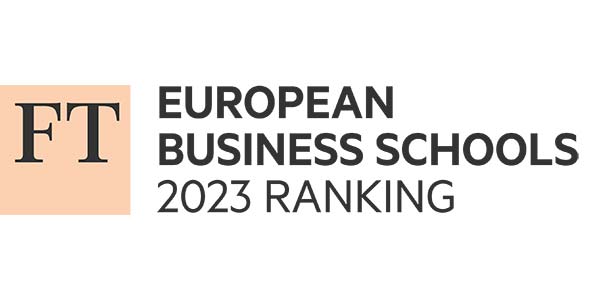MSc Entrepreneurship, Innovation & Technology
ApplyKey facts
- Start date: September
- Accreditation: triple-accredited business school - AACSB, EQUIS & AMBA
- Study mode and duration: 12 months full-time; 24 months part-time
Small Business Charter Award: in recognition of our commitment to supporting student entrepreneurship and SMEs
Study with us
- combine theoretical knowledge with practical skills
- study a practical, career-focused programme
- undertake a virtual incubation project to develop an innovative business opportunity
- participate in entrepreneurship and innovation prizes
The Place of Useful Learning
UK University of the Year
Daily Mail University of the Year Awards 2026
Scottish University of the Year
The Sunday Times' Good University Guide 2026
Why this course?
The MSc Entrepreneurial Innovation & Technology is a highly practical programme that will help budding entrepreneurs conceive and crystallise their ideas about their venture start-up or new business project.
You'll learn how to combine theoretical knowledge with a special focus on developing the applied skills required to engage successfully in entrepreneurial activity.
The focus of this programme is the Virtual Incubator Project, during which you will work in groups to take your business idea to the next level. You will develop an innovative business opportunity and pitch to a panel of investors from the UK ecosystem.
By the end of the programme, you'll possess both the mindset and skills to 'think and act entrepreneurially'. You'll have the opportunity to engage with a dynamic innovation ecosystem through business competitions, guest lectures, knowledge exchange projects and field visits.
Linking students & local businesses
Find out how Strathclyde students and local businesses work together.
"There are a number of classes at Strathclyde Uni that require industry engagement and as a start-up we can be that industry partner for a number of classes."

What you'll study
The MSc Entrepreneurship, Innovation & Technology attracts entrepreneurs who may have launched their venture and are seeking some formal training on key topics like entrepreneurial finance or entrepreneurial mindset and leadership. The programme is also suitable for graduates from any discipline who have a business idea and are aiming to launch their start-up shortly. This intense programme introduces you to the approaches and techniques needed to take a business idea, and create a new venture.
Innovation and disruptive technologies are creating new market opportunities. This course will develop your abilities to ‘read’ what is happening in the market place and to then place your product or service offering in a strategically novel position for their new venture to be a success. The capstone, Virtual Incubator Project will help you develop your business plan.
Classes in semester 1 cover key elements of entrepreneurship. In semesters 2 and 3 the MSc Entrepreneurship, Innovation & Technology will follow a much more ‘hands-on’ practical route through the Virtual Incubator Project. It's possible to swap between programmes at the start of semester 2, based on your preferences and discussions with tutors.
Virtual Incubator Project
You'll apply the tools and techniques developed throughout the degree programme to work on a real-world innovation challenge. Using an innovative virtual platform, you'll collaborate with the UK ecosystem and will go through a stage-gate model of developing and pitching your solution to potential investors. On completion, you'll submit a portfolio of your work as part of the assessment.
Student competitions
You'll be expected to participate in national and international entrepreneurship and innovation prizes. We've a strong track record of success in various prestigious competitions and there are considerable free support networks in place to help students with their entries. The Hunter Centre for Entrepreneurship, Strategy and Innovation will provide a prize award for the best project.
Strathclyde Business School
Strathclyde Business School was founded in 1948 and is a pioneering, internationally renowned academic organisation with a reputation for research excellence.
One of four faculties forming the University of Strathclyde, SBS is a triple-accredited business school (AACSB, EQUIS and AMBA) and was the first business school in Scotland to achieve this accolade in 2004.
The Business School is home to seven subject departments and a number of specialist centres, all of which collaborate to provide a dynamic, fully-rounded and varied programme of specialist and cross-disciplinary courses.
Strathclyde Inspire
At Strathclyde, we live and breathe entrepreneurship. The University of Strathclyde started life as a place of useful learning, an institution that wanted to make a difference through dong things innovatively, boldly and socially oriented; this founding mission has never been more relevant. Today, we continue to nurture generations of influencers, innovators and industry leaders, empowering our staff, students and alumni to embrace entrepreneurship, transforming their own lives and the lives of others.
Strathclyde Inspire supports and encourages entrepreneurship in all its forms, so whether you want to be more entrepreneurial in your approach to life, business and society, have an idea for a business, or are considering commercialising your research, we will support you at every stage of your journey.
Triple-accredited business school
Creativity & Venture Planning
This class is important in terms of presenting an introduction for MSc students to the entrepreneurial process, from creative thinking to the development of a new business concept. This class has further thematic additions based on consultation with industry, specifically prototyping and storyboarding.
Mindset Lab
Mindsets are at the core of everything that people think and do. Therefore, if we want to steer entrepreneurial behaviour towards success, we need to start by shaping the mindsets of those who start ventures. From government agencies to investment panels, entrepreneurial mindsets are quickly becoming the buzzword that everyone wants to know about. But what are those mindsets? And when are they a force for good or otherwise?
In this research-based class, you'll be exposed first hand to the daily struggles and successes of early-stage entrepreneurs and will be tasked with assessing their mindsets, how those mindsets are shaped by context and how, in turn, they shape the behaviour of the entrepreneur. You'll take a fascinating journey through the latest academic thinking on mindsets and will apply that thinking to the practice you observe in the entrepreneurs you will be following. Theory and practice will inform each other as you discover the often hidden power of the mind on human fears, goals, failures and achievements.
Issues & Trends in Entrepreneurship, Innovation & Technology
This module provides a firm foundation in scholarly, practitioner and policy perspectives for "mega-trends" in entrepreneurship, innovation and technology. This is a student-driven class, where you'll develop research and presentation skills, and learn about cutting-edge developments such as digital health technology, the sharing economy and social innovation, while also learning how entrepreneurial ecosystems function.
Data Lab
As increasing volumes of data are collected and made available to the public, identifying opportunities through analysis of data is a necessary skill for the contemporary entrepreneur. This course will empower students with a range of different analytic methods and software tools that will allow them to successfully identify high-value data-drive entrepreneurial opportunities.
Strategic Innovation Management
This module is designed to build knowledge of the processes underpinning innovation. The class will provide an introduction to the main concepts and frameworks related to definitions, processes, strategies, organisation and sources of innovation. Towards the end of the class, new trends in innovation, such as social innovation and frugal innovation, will also be covered.
Entrepreneurial Finance
This class addresses how startups and small businesses source and manage finances. Finance is a core function within most organisations and is especially pivotal for startups and SMEs that need to carefully navigate to survive and grow. The class is a core Semester 2 module. It builds on Semester 1 modules that address the foundational elements required to develop a promising new business concept (e.g. Creativity and New Venture Planning, Innovation, Entrepreneurial Mindset, etc.) by bringing in the finance toolkit required to make a successful business out of a good idea.
Entrepreneurial Management & Leadership
Entrepreneurial leadership is distinct and different from leadership found in large corporates. (Röschke, 2018). Entrepreneurial leaders tend to be more adept at exploring and exploiting opportunities in the marketplace and dealing with constant change and competition.
This module will help participants better understand their own leadership style and also understand the key characteristics and behaviours of entrepreneurial leaders. Entrepreneurial management shows similarities to management functions in established organisations – strategic planning, marketing, etc. However, is it really necessary in a start-up situation? This module will explore the importance of entrepreneurial management and how start-ups and SMEs can benefit from having a programmed approach to growing the business.
Social Entrepreneurship (10 credits)
There is a growth in the number of entrepreneurs starting businesses with social and environmental purposes. This module examines ideas and practices for addressing social needs. These include social enterprises, collaborative innovation networks, hubs, digital platforms, and support intermediaries. The module is centred around how students can start their own social entrepreneurship projects. The module will consist of a selection of presentations and discussions around social innovation and social entrepreneurship.
Internationalisation & Growth
The Internationalisation & Growth lab recognises that in today’s globalised business world, ventures often face international competition and international opportunities from inception. Therefore internationalisation is no longer the premise of larger, more established corporations but it also happens in new and small firms. Identifying and selecting international markets for entry requires considering a number of factors and planning accordingly. This lab will equip students with the critical and applied understanding needed to plan international market selection and entry.
Disruptive Technologies
New technologies and scientific breakthroughs have the potential to ‘change the game’ for businesses, leading to new products and services. SMEs cannot leave evolving technologies to the large corporates and hope to play catch up. SMEs need to appreciate how new technologies can be used to give them a competitive advantage and bring them new customers. This module explores the role of new technologies and innovation in different industry settings to critically analyse how SMEs can take advantage of disruptive innovation.
Virtual Incubator Project
The Virtual Incubator Project is the culmination of the programme. Here, you'll be expected to put into practice all of the skills and knowledge developed over the previous nine months in order to bring a business proposition to an investment panel. You're expected to identify a suitable business idea, use primary and secondary market research for validation, and demonstrate your ability to develop the infrastructure to operationalise and grow your business. It's an accelerated incubation program run in partnership with the Entrepreneurship Accelerator Hub at the Royal Bank of Scotland.
Over the six-week period, you'll work to go from an initial idea to investable business opportunity. In weeks 4 and 6 you'll present a working proposal to different investor audiences with the final pitch in week 6 being delivered to the Scottish EDGE panel. During the incubation period, you'll occasionally have access to ‘hot-desk’ facilities at the Entrepreneurial Hub in the city centre, and we encourage you to network, learn and support the other entrepreneurs-in-residence.
Most of the six-week period will be self-directed time for you to research and validate your ideas. Formal activities will predominately take place on Wednesdays, where you'll attend workshops, soundboard sessions with the academic team, and social events.

Learning & teaching
The bulk of the taught classes run in semesters one and two. However, there will still be classes and workshops running in semester three, so you'll be required to be present in Glasgow throughout semester three. Classes will be taught through a combination of lectures, workshops, lab sessions and practical activities. The Virtual Incubator Project is undertaken in Glasgow from May to September.
Assessment
Assessments methods vary by class. Typical assessment will be through a combination of group assignments, individual assignments and exams. Exams will take place at the end of each semester in December and April/May.
Chat to a student ambassador
Want to know more about what it’s like to be a Strathclyde Business School student at the University of Strathclyde? A selection of our current students are here to help!
Our Unibuddy ambassadors can answer all the questions you may have about their course experiences and studying at Strathclyde, along with offering insight into life in Glasgow and Scotland.
Entry requirements
| Academic requirements | Minimum second-class honours degree or overseas equivalent (view the entry requirements for your country) in any subject. |
|---|---|
| English language requirements | Students whose first language is not English must have a minimum of 6.5 IELTS score, with no individual score lower than 5.5. Get more information about the English language requirements for studying at Strathclyde. |
Pre-Masters preparation course
The Pre-Masters Programme is a preparation course held at the University of Strathclyde International Study Centre, for international students (non-UK/Ireland) who do not meet the academic entry requirements for a Masters degree at University of Strathclyde.
Upon successful completion, you'll be able to progress to this degree course at the University of Strathclyde.

Being part of the MSc Entrepreneurship, Innovation & Technology definitively was the best experience and most exciting time in my life, because it represented a radical shift in my life to pursue my goals of studying abroad.
Fees & funding
All fees quoted are for full-time courses and per academic year unless stated otherwise.
Fees may be subject to updates to maintain accuracy. Tuition fees will be notified in your offer letter.
All fees are in £ sterling, unless otherwise stated, and may be subject to revision.
Annual revision of fees
Students on programmes of study of more than one year (or studying standalone modules) should be aware that the majority of fees will increase annually.
The University will take a range of factors into account, including, but not limited to, UK inflation, changes in delivery costs and changes in Scottish and/or UK Government funding. Changes in fees will be published on the University website in October each year for the following year of study and any annual increase will be capped at a maximum of 10% per year. This cap will apply to fees from 2026/27 onwards, which will not increase by more than 10% from the previous year for continuing students.
| Scotland | £16,050 |
|---|---|
| England, Wales & Northern Ireland | £16,050 All home fee status candidates who are given an offer of study on this programme, will be automatically offered our SBS Masters scholarship for Home/UK students. |
| Republic of Ireland |
If you are an Irish citizen and have been ordinary resident in the Republic of Ireland for the three years prior to the relevant date, and will be coming to Scotland for Educational purposes only, you will meet the criteria of England, Wales & Northern Ireland fee status. For more information and advice on tuition fee status, you can visit the UKCISA - International student advice and guidance - Scotland: fee status webpage. Find out more about the University of Strathclyde's fee assessments process. |
| International | £32,800 All international candidates who are given an offer of study on this programme, will be automatically offered our SBS International Masters scholarship, which is £9,000 for this programme. A separate application is required for our higher value Dean’s Excellence Award. |
| Additional costs | Course materialsMost modules require students to buy textbooks, - assuming each module has a set textbook and 30% of these are available as free ebooks then students will be required to buy around 9 books around £40 - £50 each, therefore, we would recommend allowing around £400 for books. Final project print and binding. International studentsInternational students may have associated visa and immigration costs. Please see student visa guidance for more information. Other costsGraduation gown hire. |
| Available scholarships | Take a look at our Business School scholarships. |
Please note: the fees shown are annual and may be subject to an increase each year. Find out more about fees.
How can I fund my course?
Scottish postgraduate students
Scottish postgraduate students may be able to apply for support from the Student Awards Agency Scotland (SAAS). The support is in the form of a tuition fee loan and for eligible students, a living cost loan. Find out more about the support and how to apply.
Don’t forget to check our scholarship search for more help with fees and funding.
Students coming from England
Students ordinarily resident in England may be to apply for postgraduate support from Student Finance England. The support is a loan of up to £10,280 which can be used for both tuition fees and living costs. Find out more about the support and how to apply.
Don’t forget to check our scholarship search for more help with fees and funding.
Students coming from Wales
Students ordinarily resident in Wales may be to apply for postgraduate support from Student Finance Wales. The support is a loan of up to £10,280 which can be used for both tuition fees and living costs. Find out more about the support and how to apply.
Don’t forget to check our scholarship search for more help with fees and funding.
Students coming from Northern Ireland
Postgraduate students who are ordinarily resident in Northern Ireland may be able to apply for support from Student Finance Northern Ireland. The support is a tuition fee loan of up to £5,500. Find out more about the support and how to apply.
Don’t forget to check our scholarship search for more help with fees and funding.
International students
We've a large range of scholarships available to help you fund your studies. Check our scholarship search for more help with fees and funding.
International students
We've a thriving international community with students coming here to study from over 140 countries across the world. Find out all you need to know about studying in Glasgow at Strathclyde and hear from students about their experiences.

Careers
Graduates will be well suited to find employment in a variety of exciting roles. This may involve:
- establishing a startup
- working in an entrepreneurial ecosystem support role
- taking over a family business
- working for a high-growth SME
- taking a leadership role in a large corporation
- working for a leading consultancy
The majority of graduates chose to set up their own business or went on to work in start-ups. The ones who did not follow this route, took up graduate roles in various companies. Here are a few of the roles last recent graduates took on:
- Graduate Analyst at Cognizant
- Graduate trainee at Philip Morris
- Consultancy role
- Planner at Amazon
- Analyst at Lazard
Glasgow is Scotland's biggest & most cosmopolitan city
Our campus is based right in the very heart of Glasgow. We're in the city centre, next to the Merchant City, both of which are great locations for sightseeing, shopping and socialising alongside your studies.
Apply
For information and guidance on the application process, take a look at our How to Apply web page.
Start date: Sep 2026
Entrepreneurship, Innovation and Technology
Start date: Sep 2026
Entrepreneurship, Innovation and Technology
Contact us
SBS Postgraduate Admissions
Telephone: +44 (0)141 553 6105 / +44 (0)141 553 6116
Email: sbs.admissions@strath.ac.uk
Strathclyde Business School, University of Strathclyde
199 Cathedral Street
Glasgow
G4 0QU
Have you considered?
We've a range of postgraduate taught and Masters courses similar to this which may also be of interest.





